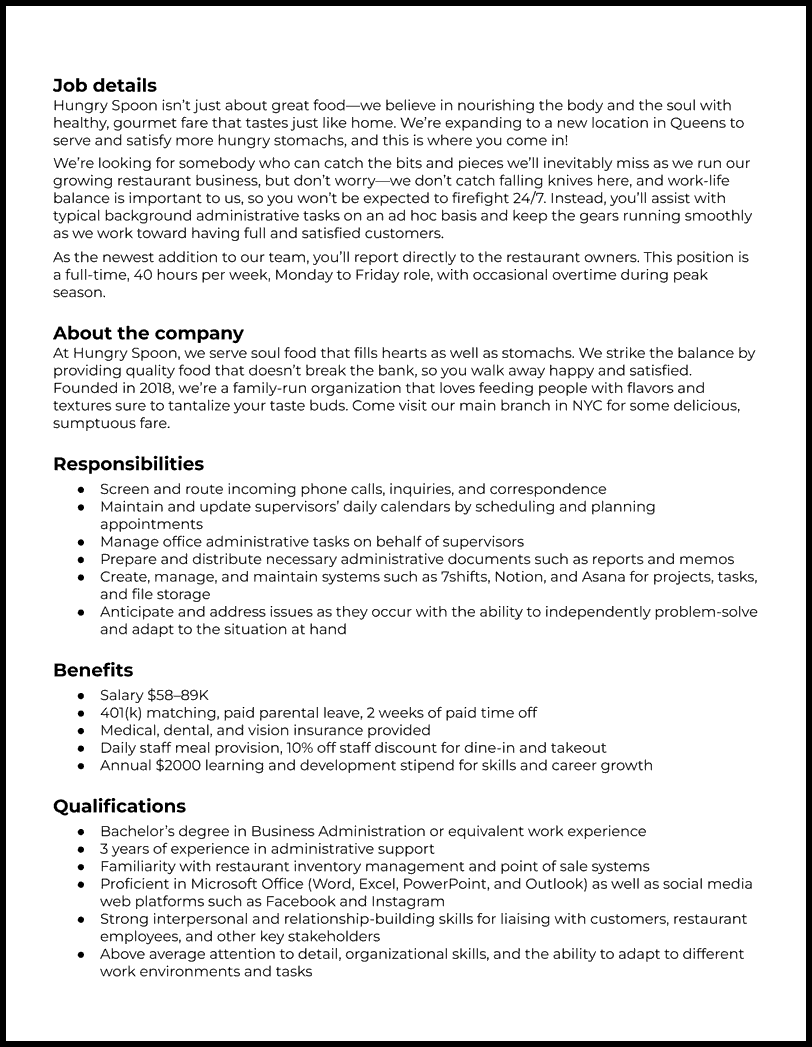You’d like to hire someone to help bring order to the daily chaos of running a business. You’ve got a hundred and one things on your plate, and an executive assistant can help shoulder some of the burden.
Executive assistants are an executive’s Swiss Army knife, with advanced skills. The best executive assistants are masters of organization and communication, with a detail-oriented, forward-thinking approach to problem-solving that helps free up valuable time.
Finding a stellar executive assistant who can help you focus on the things that matter the most might appear daunting, but we’ve got your back. This guide contains tips and advice for writing the best job description, so you can hire the best executive assistant and get on with running your business.
Craft a Tiptop Executive Assistant Job Description

Most job descriptions fail because they’re too generic – it’s one of the first points of contact you’ll have with a potential hire, but they’ll have a hard time figuring out what you need if you don’t articulate it well. Someone reading your job description will want to know who they’ll be working for, what they’ll be working on, and who they’ll be working with as a start, and “looking for a superstar assistant” just isn’t going to cut it.
A common mistake in crafting your job description is adding a miles-long qualification list, where you’ll probably be better off hiring a dedicated team instead of one individual candidate. Other mistakes include formatting, spelling, and grammatical errors that make the job requirements nigh unreadable; you might have a hard time finding an executive assistant who’ll meet your needs if essential information and clarity are missing from the hiring post.

Consider who you need on your team and why
As you write the job description that will successfully hook a qualified hire for your business, consider why you’re hiring an executive assistant as a starting point. What are you having trouble with? Are your workspaces cluttered and out of control because you’re busy running the company? Are important things starting to fall through the cracks because there’s too much to do?
An executive assistant’s job scope can expand dramatically to include just about anything under the sun, but some key traits are common among excellent executive assistants, such as organizational abilities, the wherewithal to adapt quickly to new technology, environments, and systems, as well as interpersonal relationship management skills.
Your job description should reflect these common key areas to draw in the candidates you’ll want, as like attracts like.
A couple of examples
- You want to hire someone who’s detail-oriented and organized, but is your job description sectioned in an orderly manner with no errors and typos, or is it a mishmash of whatever details come to mind?
- If you’re looking for somebody who can communicate in a succinct, concise, and clear manner, your job description should clearly outline your requirements without rambling aimlessly.

Edit, edit, edit for a fully-developed job description
It’s tempting to brain dump and just call it a day, but it’s better to sift through the mess of unfiltered thoughts and give your job description a nice polish before publishing it for the world to see. A great job posting will have requirements in different tiers: the bare minimum needed to do well at the job, some nice-to-haves, and a few bonus skills and qualifications that will really set the candidate apart from the rest.
You’re not the only person doing the interviewing here—as potential hires evaluate job postings to send their executive assistant resumes to, they’re also thinking about what it’ll be like working for you. Doing some revising and editing before posting shows that you care about the image you present to the rest of the world, and as a prospective employer, that little extra diligence shows that you probably care about your employees, too.
Kick off Your Writing by Outlining Your Executive Assistant Job Description

Here’s an outline that covers all the important parts of an executive assistant job description.

Job details
This is where it all begins—your introduction should briefly tell the applicant what the role and organization are about, including details pertinent to the job. Who are you, what are you looking for, and why should they work for you specifically? One to two sentences should suffice, as this section acts as a teaser for more to come.

About the company
This section comes next, and it tells prospective applicants more about your establishment. Executive assistants do best when they’re given complete information, so add a few details about your goals, mission, values, and work culture—this will help them quickly adjust to supporting you in a new office environment. If your business is notably different from the run-of-the-mill office setting, this is also where you tell them more about what you do.

What you’ll be doing
Here, you’ll include a bulleted list of what the applicant will do once they’re hired. Most applicants can fill in the blanks and read between the lines, but executive assistants work differently depending on the company they’re with—being specific and transparent about what you expect will go a long way in helping you find someone who fits. Keep this list short, and simple, and use active verbs in your description, avoiding jargon and filler words whenever possible.
- Screen and route incoming phone calls, inquiries, and correspondence
- Prepare and distribute necessary administrative documents such as reports and memos
- Manage expenses, pantry inventory, and office cleanliness
- Manage calendar for our co-founder, scheduling meetings, organizing travel itinerary and logistics, and generating minutes for meetings attended

Qualifications
This is one of the most important parts of the job description because it includes the most basic requirements a candidate must have. These are usually things such as education, experience, certifications, and specialized requirements like proficiency in workspace organization systems. Most candidates will skim through job descriptions as they look for a role that suits them, so ensure this section is easy to read, unambiguous and concise.
Relevant personality words like “organized,” “detail-oriented,” and “adaptability” are great for soft skills, but avoid overusing them.
- Bachelor’s degree in Business Administration or equivalent experience
- 3 years of experience in administrative support
- Proficient in Microsoft Office (Word, Excel, PowerPoint) and Google Workspace
- Detail and solutions-oriented with a strong work ethic, adaptability, and initiative

Benefits
This is the most flexible section of all, as it can go anywhere in the job description as long as it isn’t the introduction. Executive assistant roles can be challenging, so if you’ve got something unique to offer that differentiates your company, this is where you’ll use it as a selling point to attract the right candidate. Be specific, clear, and transparent about the benefits you list.
Roles and duties inside the executive assistant industry

Executive assistants are like superheroes. In overseeing and maintaining the smooth function of an office workspace or an executive’s busy work obligations, they wear many hats and command a broad skill set, including calendar management, file systems organization, customer service, human resource management, and more. Just as every company and executive has different needs, executive assistants also have varying roles.
Listed below are some of the duties an executive assistant might take on. An executive assistant might only fill some of these roles, but this is a good start to figuring out your job description.

Calendar manager
- As executives go out and about representing the company and making change happen, executive assistants take on the more tedious but no less important aspects of running a business. They organize and manage an executive’s limited time, ensuring that their day-to-day schedule runs smoothly, allowing the executive to focus on performing their job well.
- Maintain and update supervisors’ daily calendars by scheduling and planning appointments
- Plan travel arrangements, complete with itinerary and logistics details
- This role requires strong organizational skills, management abilities, and flexibility as schedules can change at the drop of a hat.

Public communications liaison
- Busy executives often have so much on their plates that communicating with key stakeholders can sometimes become impossible. Great executive assistants can function as intermediaries in such situations through their strong written and verbal communication skills. They also help free up an exec’s time and energy so that they can be expended on crucial issues.
- Receive incoming calls, emails, and visitors on behalf of the assigned C-level executive
- Maintain confidentiality and professionalism as a representative of the company
- Maintain positive and productive communication with key stakeholders by phone, email, and in person
- This role requires excellent written and verbal communication as well as relationship-building skills for liaising with clients, staff, and supervisors.

Administrator
- An executive spends a great deal of time and energy being the face of a business while also trying to juggle the various other commitments that come with the position, and this sometimes requires outside help. In such cases, an executive assistant takes on the role of a second executive, the key focus being to keep key stakeholders in the loop while ensuring the other parts of the business are chugging along as intended.
- Analyze, prepare, and distribute reports and administrative documents
- Receive, record, and route all interactions on behalf of the supported executive to the necessary parties through email or telephone
- This role requires proficiency in Microsoft Office (Word, Excel, PowerPoint, and Outlook) as well as Google Workspace for workflow management purposes.

Troubleshooter
- Some situations need an executive on hand, but with their busy schedule and work commitments, they’re not always available to make the tough calls. As an exec’s right hand, the executive assistant must sometimes act on their behalf, taking on the decision-making process, especially in urgent situations that can’t be easily delegated.
- Anticipate and address issues as they occur with the ability to independently problem-solve and adapt to the situation at hand
- Handle additional administrative tasks on an ad hoc basis
- This role requires a proactive mindset, flexibility, and the ability to think on your feet and problem-solve.

Administrator
- An executive’s job often encompasses an array of administrative and organizational activities that don’t easily fit under one specific job description. Part of an executive assistant’s job involves supporting these activities and may even include taking over particular roles to help facilitate an optimal work environment.
- Train, coach, guide or supervise other administrative staff as required
- Manage office administrative tasks on behalf of supervisors
- This role requires office management skills such as overseeing expenses, maintaining inventory and office cleanliness, welcoming guests, and organizing team events for the company.








